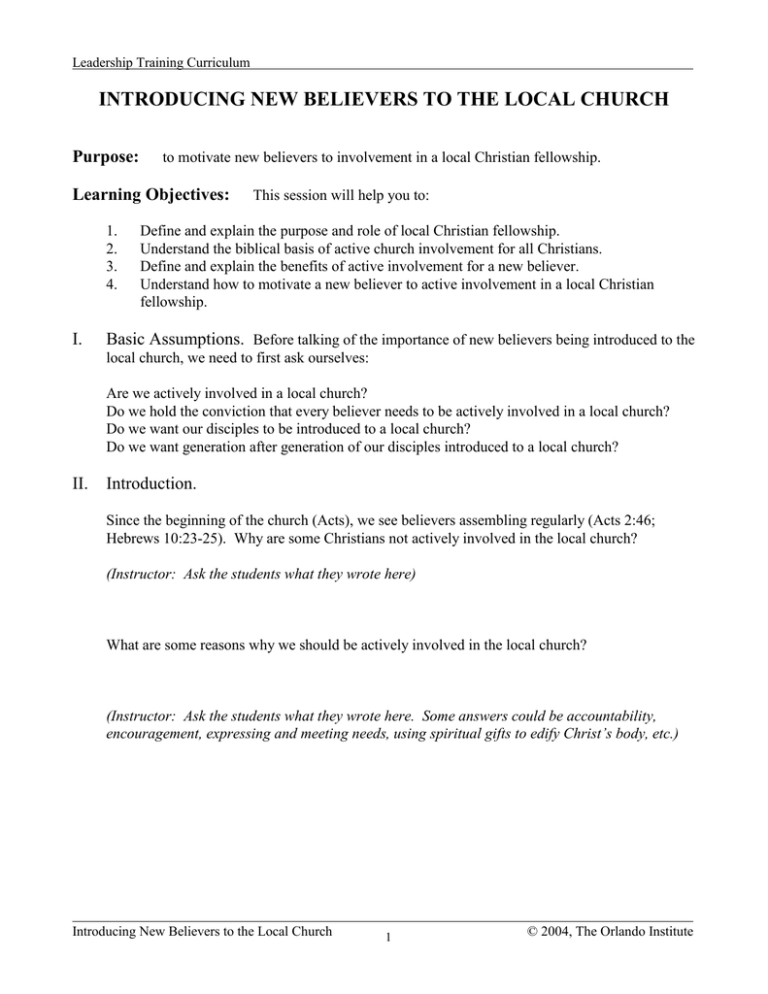INTRODUCING NEW BELIEVERS TO THE LOCAL CHURCH Purpose: Learning
advertisement

Leadership Training Curriculum INTRODUCING NEW BELIEVERS TO THE LOCAL CHURCH Purpose: to motivate new believers to involvement in a local Christian fellowship. Learning Objectives: 1. 2. 3. 4. I. This session will help you to: Define and explain the purpose and role of local Christian fellowship. Understand the biblical basis of active church involvement for all Christians. Define and explain the benefits of active involvement for a new believer. Understand how to motivate a new believer to active involvement in a local Christian fellowship. Basic Assumptions. Before talking of the importance of new believers being introduced to the local church, we need to first ask ourselves: Are we actively involved in a local church? Do we hold the conviction that every believer needs to be actively involved in a local church? Do we want our disciples to be introduced to a local church? Do we want generation after generation of our disciples introduced to a local church? II. Introduction. Since the beginning of the church (Acts), we see believers assembling regularly (Acts 2:46; Hebrews 10:23-25). Why are some Christians not actively involved in the local church? (Instructor: Ask the students what they wrote here) What are some reasons why we should be actively involved in the local church? (Instructor: Ask the students what they wrote here. Some answers could be accountability, encouragement, expressing and meeting needs, using spiritual gifts to edify Christ’s body, etc.) Introducing New Believers to the Local Church 1 © 2004, The Orlando Institute Leadership Training Curriculum III. When and How to Address the Issue of Church Involvement with New Believers. A. Case Study: After a successful evangelistic effort in your target audience, you have several new converts. You have already begun the process of follow-up. Two of the converts have had no prior church experience. Two have attended churches which do not preach salvation through Jesus Christ and one has strong ties to his family's church, a dominant yet nonevangelical denomination. Questions to consider: l. When do you bring up the issue of church involvement? 2. How will you go about educating them about the importance of assembling together? 3. Will you need to exercise caution with any of them? 4. If so, what will be your approach? Write down your thoughts on these questions, especially as they relate to those you are mentoring. B. Principles: l. New believers should be introduced to the local church as soon after conversion as possible. Why? a. Example of early church (Acts 2:41) b. Helps to guard the seed which has been sown (Mark 4). c. "A cord of three strands is not quickly broken" (Ecclesiastes 4:12). 2. If appropriate, take them to your church with you. 3. Sit down with individuals and challenge them to active involvement in a local church. This should be done individually, due to potential barriers which could exist for the new believer to begin attending a Bible believing congregation. 4. Communicate biblically and philosophically the rationale for active involvement in a local church (see last page for handout). IV. What to communicate. A. The purpose of the church. The church is a gift from God to His people. It is designed by God to be His tool for building His people, and so involvement with other Christians within the church is meant to be one of the greatest blessings of our lives. Introducing New Believers to the Local Church 2 © 2004, The Orlando Institute Leadership Training Curriculum The Greek word translated as church is "ecclesia," which means "to call aside." That term was also used as "assembly," which was adopted in the New Testament to mean two things. One refers to the place where Christians gathered to worship, study the Bible, teach and work. The other refers to the collective church, made up of all who believe in Jesus Christ. As believers meet together they enjoy "fellowship." Fellowship can be defined as a relationship of understanding and commitment with other believers based on love for Christ. The main meaning of the word is to "share in common." This is not just a group of people in the same room at the same time, but a group of interrelated brothers and sisters in Christ. From the following verses, come up with additional reasons why the church exists: 2 Timothy 4:2 . (preaching the Word) Ephesians 4:11-13. (equipping the saints for work) Matthew 28:19. (baptism) 1 Corinthians 11:23-26. (Lord’s supper) B. Biblical basis for active church involvement. The Christian life is a simple walk that was not meant to be walked alone. There is flexibility as to “how” Christians assemble, but one thing is definite – we must assemble. What does it mean to be actively involved in a local church? Read Acts 2:42-47 and write down what you observe to be “active involvement.” (Note to instructor: if not already mentioned, you could say, “Verse 42 shows they fervently followed – they put themselves under the apostles teaching. Verses 44 and 45 show that they sacrificed freely – they ministered to each other. Verse 46 shows that they regularly participated. Verse 47 shows that they fellowshipped with joy – they wanted to be together. They were also active in ministry. C. Benefits of active church involvement. In the church: l. 2. 3. 4. 5. 6. D. We exercise our gifts to build up the body (1 Corinthians 12). We have accountability. The church consists of brothers and sisters in Christ who will love, accept, and correct you when necessary (Galatians 6:1,2). We have fellowship (Hebrews 10:24,25). We hear the word of God (Acts 2:42). We have protection (Hebrews 13:17). We practice expression of the sacraments (baptism and Lord's supper). Criteria for selecting a local church. There is no perfect church, but look for one that has the following criteria: Introducing New Believers to the Local Church 3 © 2004, The Orlando Institute Leadership Training Curriculum 1. 2. First and foremost, the local church you select should be a place where: a. Christ is honored. Revelation 2 and 3. He is the head of His body, the church (Ephesians 5:23). b. God's word is honored as holy, true, infallible, and authoritative (Isaiah 66:1,2). c. His word is faithfully preached on a regular basis (2 Timothy 4:2). Committed to world evangelization (Matthew 28:18-20; Acts 1:8). V. Questions and Answers. A. If a new believer must choose between involvement in a local church, or involvement in the movement, which should take precedence? Why? Answer: Both should compliment one another. If a choice must be made, give priority to the church. B. What if they are already involved in a church, but the word of God is not faithfully preached? Answer: Be cautious. Express the importance of hearing Biblical truth. The mentor can often ask, “What are you learning in church?” “What was the sermon about?” “What Scriptures were taught in Sunday School and church?” Challenge the disciple to active involvement in a God-honored biblically sound church. Then, let God be God and let the Holy Spirit convict him/her. It must be his/her decision. C. What if the family of the new convert doesn't wish their son/daughter to switch churches? Answer: 1) Until we leave the house, we are under the parent’s authority. 2) Stay with the parents if possible. 3) If the disciple is out from under his/her parents provision and authority, he/she is responsible to make their own decision, not the parents. We are to honor our parents, and yet the adult child is responsible for their own decisions. If the parent’s church undermines the disciple’s faith or it causes the disciple to be spiritually malnourished, encourage the disciple to leave. Help the disciple work through the issue of loving God more than our parents (Luke 14:26). Discussion Questions 1. 2. 3. 4. 5. 6. What is the purpose of the local church? What are some of the criteria in selecting a local Christian fellowship? How would you explain “active involvement” in a local church? What are some benefits of active involvement in the local church? How are you actively involved in your local church? Are your disciples actively involved in a local church? If not, when and how will you motivate them in this area? Introducing New Believers to the Local Church 4 © 2004, The Orlando Institute Beginning Your New Life in Christian Fellowship Purpose: The church is a gift from God to His people. It is designed by God to be His tool for building His people. (Ephesians 4:12-16) Biblical Basis: Hebrews 10:23-25. What are we admonished to do? The Church is the "Body of Christ," composed of all true believers. Each local church is a group of believers who meet regularly to glorify God. What does it mean to be actively involved in a local church? Acts 2:42-47 l. 2. 3. 4. 5. Fervently follow a mentor/discipler. Regularly participate in worship. Sacrifice freely (minister to others) Fellowship with joy. Active in evangelism and discipleship. Benefits: l. Exercise your gifts (1 Corinthians 12; Romans 12:4-8; I Peter 4:10,11). 2. Accountability to your mentor and your church (I Corinthians 5:12; II Timothy 4:2; Galatians 6:1,2). 3. Hear the Word of God (Acts 2:42; 17:11; II Timothy 4:2). 4. Spiritual protection (Hebrews 13:17). 5. Fellowship (Ecclesiastes 4:12; Acts 2:42; I Thessalonians 5:11). 6. The Lord’s Supper and Baptism (1 Corinthians 11:23-27; Matthew 28:19). Criteria Check List: Seek out a church that: l. Honors and preaches the word of God. 2. Is committed to world evangelization. 3. Practices Communion and Baptism in a Biblically sound way. 4. Recognizes Jesus as fully God and fully man. When do you plan on visiting a church? Would you like to come with me and visit mine?






